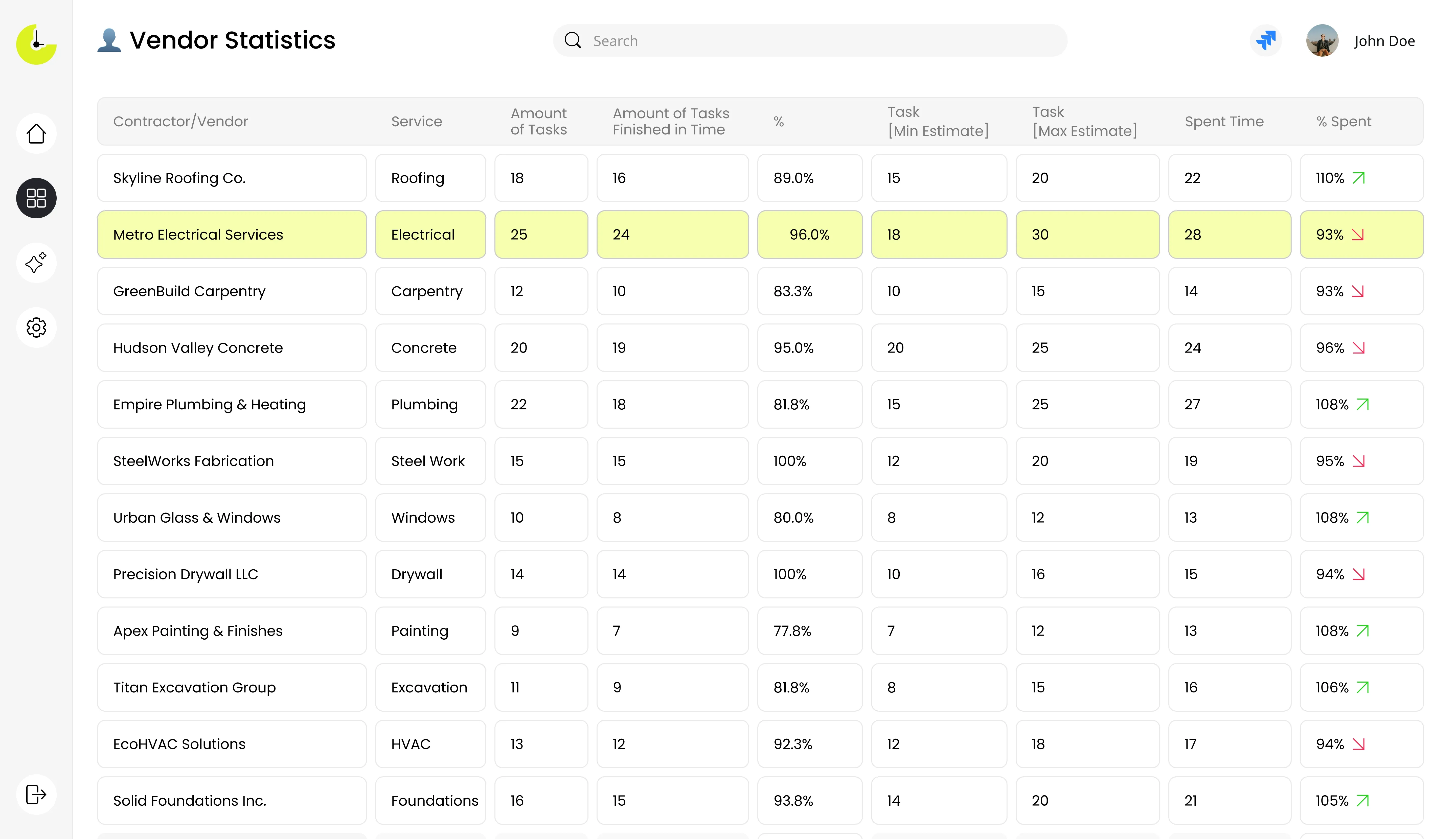Under NDA
BuilderPlan.ai
It is a centralized platform with a built-in dashboard and tools for data gathering and analysis, explicitly designed to enhance task and project estimations in construction, reducing mistakes and miscalculations. Additionally, it features a built-in AI assistant that can process gathered data and assist with planning and analysis.
Location
Industry
Services
Project Overview
Project Goals
Our business client sought a more innovative and efficient software solution to replace their existing construction system. During the discovery and estimation stage of our cooperation, we proposed a new system from scratch, featuring numerous process automation options and a built-in AI model for data analysis and project estimation.
As a result, in addition to developing a modernized construction software system, with familiar UX/UI for employees’ convenience, we were also responsible for a more complex technological integration and adjustment. As a result, our client got a semi-autonomous management software that streamlines multiple manual operations and also helps to make much more accurate plans and estimations.
Scope of Work
To ensure the employees’ convenience, we designed the system’s UI similarly to the previous software solutions used in the company. User-friendly UX/UI was among the core demands, so the system’s design is highly minimalistic with straightforward and intuitive controls. Additionally, we have created a separate list of tasks, divided by categories, to simplify the process of analysis and management.
Additionally, the same lists display the number of tasks performed/to be done, as well as the success and accuracy rates of meeting deadlines. An AI assistant utilizes the same statistical models as historical data to make predictions and recommendations for future estimations. Finally, the system provides an estimate analysis board, where managers can oversee all projects, including differences between estimated and actual spending, required time differences, etc.
Challenges & Solutions
Achieving accurate cost projections
and automated calculations to minimize errors and account for all expenses.
Tracking employees' performance
and data on all assigned projects and tasks, with essential data and automated calculations.
Resource-intensive and time-consuming estimation
with access to real-time data and statistics on previous projects, capable of analyzing historical data and making predictions, based on the results.
Business Benefits
BuilderPlan helps businesses to provide more efficient and competitive services:
35%
decrease in project cost overruns
30%
reduction in time spent on estimations
15%
reduction in compliance risks
Solutions & Features
Project Statistics
A spreadsheet-like design was chosen for the convenience of employees. Thus, it took less time and effort for specialists to adapt to the new system due to the resemblance to the previous solutions (primarily spreadsheets and Excel tables). On this page, users can find all essential information about in-progress tasks, including their description, relevance to Jira or other systems, and other crucial factors such as estimation accuracy percentage, etc.
Vendor Statistics
The contractor Statistics tab is similar to the Projects page. Yet, here the focus drifts to your contractors and employees. It displays information such as the partner's name, the services they provide, the number of tasks they have performed, and the number of tasks they have completed on time. Apart from that, each contractor line displays a negative (max) and an optimistic (min) task estimate, as well as the actual time spent. Finally, the system automatically calculates the correlation and displays the success percentage for easier navigation.
Estimate Analysis
This tab falls between Project Statistics and Contractor Statistics. Here, managers or other specialists can find all details on each task, including its categorization, a general task count, the number of tasks completed within deadlines, the success rate, and more. This is the most essential part of the system, providing users with the most detailed reports on each task, which helps identify the most common mistakes or miscalculations when estimating specific tasks.
AI Consulting
Finally, the platform offers AI consulting in a chat format. The AI module has access to other parts of the system, as well as the data stored within them. As a result, this virtual assistant can process arrays of data for various projects, tasks, or employees/contractors, identifying patterns or anomalies. Based on this research of actual and historical data, the AI assistant can perform automated estimation of the request or review the estimate made by employees, suggesting potential corrections or highlighting mistakes.
Take a Closer Look at the Project’s Core Features and Design
Get in touch!
Let's discover how we can help you reach your goals.
This site uses cookies to improve your user experience. Read our Privacy Policy
Accept
